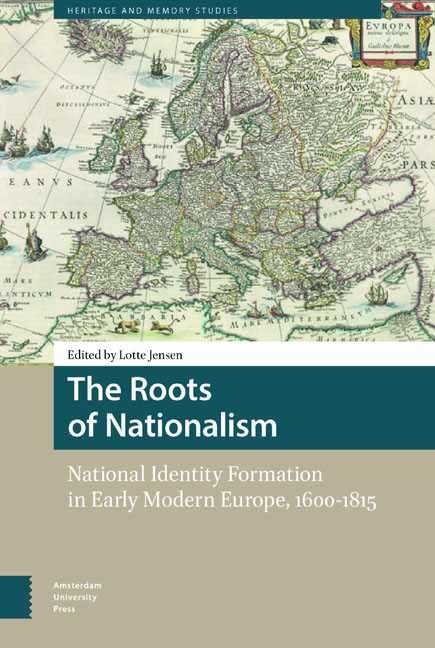Book contents
- Frontmatter
- Contents
- The Roots of Nationalism: Introduction
- Part One The Modernist Paradigm Contested
- Part Two The Genealogy of National Identity
- Part Three Negative Mirror Imaging
- Part Four Maps, Language and Canonisation
- Part Five Nation in the Age of Revolution
- List of Illustrations
- List of Contributors
- Index
1 - Premodern Nations, National Identities, National Sentiments and National Solidarity
Published online by Cambridge University Press: 03 February 2021
- Frontmatter
- Contents
- The Roots of Nationalism: Introduction
- Part One The Modernist Paradigm Contested
- Part Two The Genealogy of National Identity
- Part Three Negative Mirror Imaging
- Part Four Maps, Language and Canonisation
- Part Five Nation in the Age of Revolution
- List of Illustrations
- List of Contributors
- Index
Summary
While the subject of this volume, like the conference from which it emanates, is early modern nationalism in Europe, the task set to me by the editor is to broaden the frame and discuss premodern nationalism not merely over centuries but over millennia, and not only in Europe but throughout the world. Indeed, my book (with Alexander Yakobson), Nations: The Long History and Deep Roots of Political Ethnicity and Nationalism (Cambridge UP, 2013), challenges the modernist portrayal of nationalism as recent and superficial. The book argues that, reflecting the post-1945 climate of ideas and normative atmosphere, modernists have lost sight of the ethno-national phenomenon's deep roots, and have declared the nation and nationalism to be a pure socio-historical construct or artificially contrived. As a result, they misinterpret the ethno-national phenomenon's historical trajectory and either remain confounded by or turn a blind eye to its highly explosive potency, so evidently one of the strongest forces in human history.
Nations and nationalism are not primordial. Nonetheless, they are rooted in primordial human sentiments of kin-culture affinity, solidarity and mutual cooperation, evolutionarily engraved in human nature. These attachments, permeating social life and extending beyond family to tribe and ethnos, became integral to politics when states emerged millennia ago. Ethnicity has always been political and politicised, ever since the beginning of politics, because people have always been heavily biased towards those they view as their kin-culture community. Needless to say, no ethnic identity or people comes neatly packaged with an unchanging essence. Ethnogenesis, processes of ethnic and national fission and fusion, changes of identity and cultural transformation, take place all the time. And still, while always in flux, ethnic and national identities are among the most durable, and most potent, of cultural forms.
Political Ethnicity and Premodern Imagined Communities
I have introduced the concept of political ethnicity to describe this reality whose historical salience cannot be exaggerated despite the fact that it has been largely downplayed in the literature on the national phenomenon. Similarly, I do not use the terms primordial and perennial to describe the counter-modernist position, as both of them sound metaphysical and unreal, and, indeed, have been invoked as a caricature by modernists.
- Type
- Chapter
- Information
- The Roots of NationalismNational Identity Formation in Early Modern Europe, 1600–1815, pp. 31 - 46Publisher: Amsterdam University PressPrint publication year: 2016



